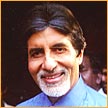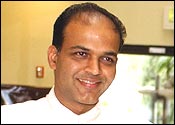
|
What's with 'Bollywood'?
Is the term derogatory to the world's biggest film producer?
|
Deepa Gahlot
Industry folk like Amitabh Bachchan, Shah Rukh Khan and Subhash Ghai get offended at the word 'Bollywood'. They believe it is derogatory to the biggest producer of films in the world.
Now, 'Bollywood' events are popping up all over the globe and books with 'Bollywood' in their title coming out with increasing frequency. Can our industry fight the 'Bollywood' fad?
At a recent book release function, it was revealed that the cheeky word was coined by producer Amit Khanna in the 70s. Over the years, its usage was popularised up to the point when, because of the current interest in popular cinema abroad, Bollywood came to represent the song-and-dance melodramas from the Mumbai film industry.
This cinema was looked upon with ridicule in the West till recently. Now, with Hindi (or Hindi-style films in other Indian languages) being money-spinners in the West due to the burgeoning Asian population everywhere, the same word is used with a sense of grudging respect.
While Ashutosh Gowariker (a dedicated film festival buff) protests vehemently against his kind of cinema and that of filmmakers like Shyam Benegal, Adoor Gopalakrishnan and Buddhadeb Dasgupta being clubbed under the common Bollywood label, Amit Khanna is of the opinion that it is now a successful brand, so why not capitalise on it.
Poet-writer-director Gulzar humorously says that it is label stuck on to his back, which he doesn't want, but has to accept, 'like the Mughals never wanted to be called Mughals, but the Taimur Dynasty. However, the name stuck'.
 While a section of Indian cinema liberally steals plots, frames, music and titles from Hollywood and really, can hardly crib when they are called Bollywood, there is another section --- Adoor Gopalakrishnan, Buddhadeb Dasgupta, Rituparno Ghosh, Gautam Ghose, Shaji N Karun, Jayaraj, Aparna Sen, Jahnu Barua --- which has created its own conventions and does not sit comfortably under the Bollywood banner.
While a section of Indian cinema liberally steals plots, frames, music and titles from Hollywood and really, can hardly crib when they are called Bollywood, there is another section --- Adoor Gopalakrishnan, Buddhadeb Dasgupta, Rituparno Ghosh, Gautam Ghose, Shaji N Karun, Jayaraj, Aparna Sen, Jahnu Barua --- which has created its own conventions and does not sit comfortably under the Bollywood banner.
As Shyam Benegal points out, the entire parallel cinema movement of the 1970s was opposed to the form and style of popular cinema, so it seems cruel to now club it along with the very cinema it rebelled against. Even though filmmakers like Benegal and Govind Nihalani have accepted some conventions of popular cinema, their films are no more Bollywood than the individualistic cinema of Raj Kapoor, Guru Dutt, Bimal Roy, who worked within the framework of popular cinema.
Gowariker argues that Japanese cinema is not called Jollywood, Chinese cinema is not Chollywood and so on. Since everybody borrows from others --- Hollywood from Europe, Europe from Latin America, Latin America from Japan --- why does the Indian film industry insult itself by agreeing to be called Bollywood? (Incidentally, a large section of the American film industry has moved out of Hollywood, but the name has stuck!)
The problem is how to explain to the uninitiated foreigner that Indian cinema is not just Hindi cinema but includes Malayalam, Tamil, Telugu, Kannada, Bengali, Oriya, Assamese, Marathi cinema. To a foreigner, all Indian languages have to be understood through subtitles and all Indian actors belong to the same race and colour.
 If, like Gowariker suggests, the term Indian Film Industry or its bland acronym IFI is forced into currency, the 'crossover' audience enjoying Lagaan or Monsoon Wedding will still think, 'Ah! Bollywood!' whenever they see a song and dance. They will be puzzled if an Indian film does not have the familiar elements.
If, like Gowariker suggests, the term Indian Film Industry or its bland acronym IFI is forced into currency, the 'crossover' audience enjoying Lagaan or Monsoon Wedding will still think, 'Ah! Bollywood!' whenever they see a song and dance. They will be puzzled if an Indian film does not have the familiar elements.
Unfortunately, like a majority of audience in India, the foreign audience wants an escapist, noisy, corny, musical Bollywood film. Only the discerning would appreciate the bleak artistic sagas of the great masters.
Whether we like it or not, Bollywood --- as in Hum Aapke Hain Koun...!, Dilwale Dulhania Le Jaayenge, Dil Se, Taal, Kabhi Khushi Kabhie Gham --- has broken the global barriers but not the art cinemawalas. Just like chicken tikka has captured the global palate but not puran poli.
Tell the foreigner that Indian cuisine is so rich and varied, he will still want hybrid balti cuisine.
Earlier column
E-mail Deepa Gahlot